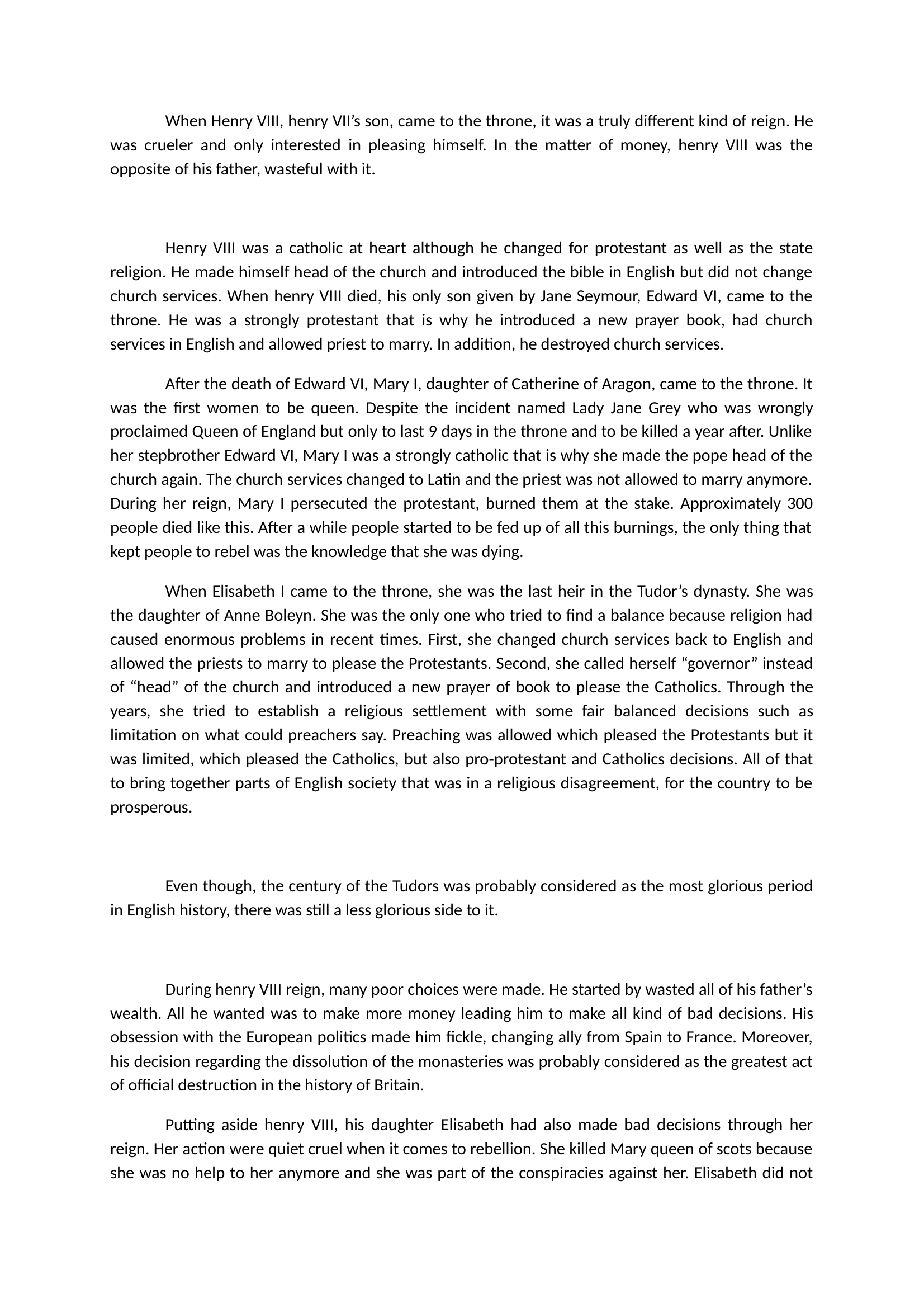tudor's dynasty
Publié le 08/12/2015

Extrait du document
«
When Henry VIII, henry VII’s son, came to the throne, it was a truly different kind of reign.
He
was crueler and only interested in pleasing himself.
In the matter of money, henry VIII was the
opposite of his father, wasteful with it.
Henry VIII was a catholic at heart although he changed for protestant as well as the state
religion.
He made himself head of the church and introduced the bible in English but did not change
church services.
When henry VIII died, his only son given by Jane Seymour, Edward VI, came to the
throne.
He was a strongly protestant that is why he introduced a new prayer book, had church
services in English and allowed priest to marry.
In addition, he destroyed church services.
After the death of Edward VI, Mary I, daughter of Catherine of Aragon, came to the throne.
It
was the first women to be queen.
Despite the incident named Lady Jane Grey who was wrongly
proclaimed Queen of England but only to last 9 days in the throne and to be killed a year after.
Unlike
her stepbrother Edward VI, Mary I was a strongly catholic that is why she made the pope head of the
church again.
The church services changed to Latin and the priest was not allowed to marry anymore.
During her reign, Mary I persecuted the protestant, burned them at the stake.
Approximately 300
people died like this.
After a while people started to be fed up of all this burnings, the only thing that
kept people to rebel was the knowledge that she was dying.
When Elisabeth I came to the throne, she was the last heir in the Tudor ’s dynasty.
She was
the daughter of Anne Boleyn.
She was the only one who tried to find a balance because religion had
caused enormous problems in recent times.
First, she changed church services back to English and
allowed the priests to marry to please the Protestants.
Second, she called herself “governor” instead
of “head” of the church and introduced a new prayer of book to please the Catholics.
Through the
years, she tried to establish a religious settlement with some fair balanced decisions such as
limitation on what could preachers say.
Preaching was allowed which pleased the Protestants but it
was limited, which pleased the Catholics, but also pro-protestant and Catholics decisions.
All of that
to bring together parts of English society that was in a religious disagreement, for the country to be
prosperous.
Even though, the century of the Tudors was probably considered as the most glorious period
in English history, there was still a less glorious side to it.
During henry VIII reign, many poor choices were made.
He started by wasted all of his father’s
wealth.
All he wanted was to make more money leading him to make all kind of bad decisions.
His
obsession with the European politics made him fickle, changing ally from Spain to France.
Moreover,
his decision regarding the dissolution of the monasteries was probably considered as the greatest act
of official destruction in the history of Britain.
Putting aside henry VIII, his daughter Elisabeth had also made bad decisions through her
reign.
Her action were quiet cruel when it comes to rebellion.
She killed Mary queen of scots because
she was no help to her anymore and she was part of the conspiracies against her.
Elisabeth did not.
»
↓↓↓ APERÇU DU DOCUMENT ↓↓↓
Liens utiles
- PAROLES ASSORTIES de Tudor Arghezi
- MARIE TUDOR de Victor Hugo. Résumé
- Tudor.
- Qing Dynasty - history.
- Han Dynasty - history.

































